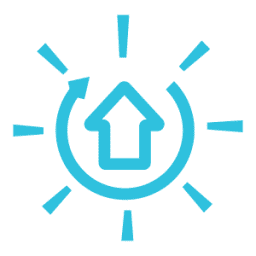How To Pick The Right Internet Plan
Once you start looking at different internet plans, you'll see pretty quickly that the sales pages are full of technical jargon. So, before we get into how to pick the best internet plan for you, here is a quick breakdown of what common internet plan terms mean:
- Mbps - Mbps stands for "megabits per second" and is a common way for internet service providers to calculate their connection speed. The higher, the better.
- Cable - Cable internet uses the same connections as cable television to send data. Since it is hardwired, it is fairly reliable and fast.
- DSL - DSL stands for Digital Subscriber Line and it is an internet that is delivered through phone lines. While this can be a cheaper solution, the speeds are usually lower, especially if you live far away from the central office.
- Fiber Optic - Fiber Optic internet uses fiber-optic cables transfer data. It is the fastest option on the market, but it is also expensive and not available in most locations.
- Download speeds - The rate at which information is sent from the internet to your computer. This speed will impact thing slike loading pages or streaming.
- Upload speeds - The rate at which information is sent from your computer to the internet. This speed will impact things like sending emails or using real-time communication, like video-chats.
Know The Specs Of Your Current Internet Plan
You might be looking to save money on your internet plan, but you are happy with the speeds you currently have. If that is the case, make sure that you know exactly what you are getting. Many internet packages will use the phrase "speeds up to" which means that it is the speed you can best hope for. The truth is, a lot of times you might be getting far under.
Knowing the speed you actually need will let you be a smarter comparison shopper. To do this, go to https://www.speedtest.net/ and run three tests. Write down your download speed and your upload speed.
You should see pretty similar results each time. Assuming you're happy with these speeds and you aren't changing the method of delivery (like going from Cable to DSL) or where you live, then you can shop for a package that offers comparable speeds.
Understand Your Internet Speed Needs
Everyone thinks of streaming when it comes to internet speed, and while that is a great use, it isn't the only use. Start by thinking about your most common internet-connected activities. For most people that list might look like:
- Streaming music and videos
- Surfing sites and using social media
- Downloading picture
- Real time communication through social media or video conferencing
But don't forget that there are other things in your house that might use the internet -- a major example being home security systems and smart devices. While these devices might not use the same amount of data, they do send traffic on your network which could require better wifi and higher internet speeds.
Similarly, consider how many people (or devices) will be using your wifi network. As I write this I am on my computer, my phone is connected, my wife is streaming while surfing on her phone, and our home security are all connected.
To estimate a minimum of how much you will need, consider these rules:
- Start with 3 Mbps, then add 3 Mbps for every person in your home.
- Add 1 Mbps for each smart TV in your home
- Add 1 Mbps for each Smartphone or tablet in your home
- Add 2 Mbps for each computer, laptop, or gaming console in your home.
- Add 1 Mbps for each smart device in your home
Using these rules, I would need 17 Mbps at a minimum. If I wanted to stream in 4k, I would need much faster speeds.
See Which Intenet Providers Service Your Area
You might be thinking you want the latest and greatest internet providers have to offer and start looking for fiber optic providers. If you live anywhere but a major city, you'll probably be out of luck. The truth is, the biggest contributing factor to your internet options will be the location of your address. The more urban your home, the more options you will have for high-speed internet.
Check The Reviews
Is there anything more painful than when the internet goes out? No streaming, no gaming, no nothing. If you work from home or use wifi connectivity to save your phone's data usage, then you are in even more trouble.
It is a fact of life that at some point, you'll find yourself on the phone with a customer service representative for your ISP. Is this person going to be cool and understanding, or will you find yourself sitting on hold for 45 minutes?
Do yourself a favor and do a quick Google search for the internet service provider and add "reviews" to their name and see what comes up. Or, just check out their Facebook page. Don't trust star ratings. Instead, dig deeper are read a couple of reviews and look for trends. If you notice people complaining about outages on a regular basis, then you can count on experience one yourself.
Look For Pricing And Speed Traps
Remember how I said that ISPs will often phrase their packages as "speeds up to." There are other traps that you should be aware of when comparing internet packages. A common trap is bandwidth throttling. This is when your internet service provider intentionally slows your connection to reduce usage. If you have ever felt like your internet gets slower at the end of the month, chances are you've been throttled.
Related to this, you should look for overage fees. These occur when you exceed a data cap amount. If you exceed a certain amount of data usage, you get hit with a fee.
Think About The Extras
As the internet has become more integral to our daily lives, many internet service providers have expanded what services are included with your internet packages. Some common perks include wifi hotspots, parental controls, or even a free year subscription to a streaming service like Netflix or Hulu.
Tips To Save On Internet Service
Even if you are happy with your current internet provider, you should always shop around at least once a year. As I mentioned, this is a competitive business and internet providers are always putting out specials that can save you money. Even if you decide not to switch, knowing the competitor's offers allows you to better negotiate when your contract is up for renewal. Try calling your broadband provider and letting them know that you are considering switching -- odds are good they'll find a special deal to encourage you to stay.
Buy Your Own Equipment
Many internet companies will offer modems or wifi routers for you to rent. While this can be convenient, some quick math shows that 10 months of rental fees would cover the cost of a brand new modem that you can own. If you keep your modem for just two years before upgrading, you save yourself 14 months of rental fees, which equates to hundreds of dollars.
Bundled Services
Most high-speed internet providers offer complementary services like television, phone, and even home security. If you find yourself looking for any of these services, it might be worth looking to see how much money you could save by moving them all to this one carrier. Not only does it save money, but it's also easier to pay just one bill instead of many.
Comparison Shop
As we mentioned, it pays to know all the offers out there. Of course, doing this research can be tedious. You have to find all the providers, visit each of their sites, remember all of their packages... Luckily we've made comparing internet packages really easy.

